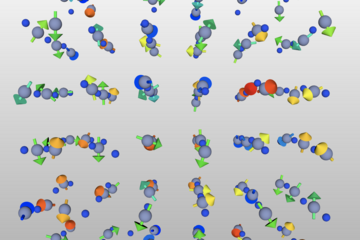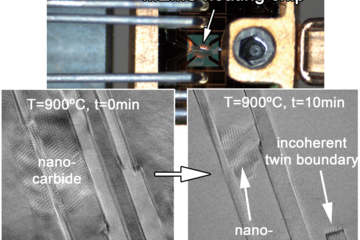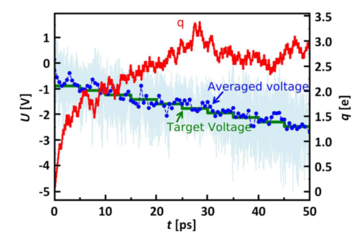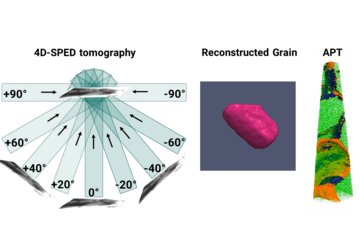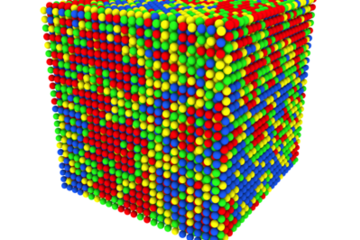All genres
321.
Talk
Pathways for fabrication of amorphous and crystalline multinary nanoparticles for electrocatalyst. 14th International Conference on Materials Chemistry MC14, Birmingham, UK (2019)
322.
Talk
Effect of planar defects on the thermal conductivity of Ag16.7Sb30Te53.3 bulk thermoelectric. 6th German/Korean Thermoelectric workshop, Daegu, South Korea (2019)
323.
Talk
Preparative and analytical challenges in electron microscopic investigation of nanostructured CuInS2 thin films for energy applications. Microscience Microscopy Congress (MMC) 2019, Manchester, UK (2019)
324.
Talk
Electron microscopy studies of Nb3O7(OH) nanostructured cubes - insights in the growth mechanism. Microscience Microscopy Congress MMC2019, Manchester, UK (2019)
325.
Talk
Microstructure and thermomechanical deformation of CrFeCoNi equiatomic CCA thin films. 26th International Symposium on Metastable, Amorphous and
Nanostructured Materials ISMANAM - 19, Chennai, India (2019)
326.
Talk
Annealing treatment in various atmospheres: A tool to control structure and properties of TiO2 nanowires. 6th International Symposium on Metastable, Amorphous and Nanostructured Materials (ISMANAM-2019), Chennai, India (2019)
327.
Talk
Effect of interfaces on the photoelectrochemical performance of functional oxides. PICS3 2019 Meeting, Centre Interdisciplinaire de Nanoscience de Marseille, Marseille, France (2019)
328.
Talk
Advanced Cs corrected STEM imaging coupled to 3D atom probe tomography. SCANDEM 2019, Gothenburg, Sweden (2019)
329.
Talk
Electron microscopic investigation of the influence of plasma parameters on VOx films deposited by a plasma ion assisted process. E-MRS 2019 Spring Meeting, Nice, France (2019)
330.
Talk
κ carbide microstructures and the role of interfaces in high-Mn lightweight steels. High-Mn Steel 2019, Aachen, Germany (2019)
331.
Talk
The importance of crystallographic defects in Ag16.7Sb30Te53.3 thermoelectric bulk materials for the thermoelectric properties. EBSD conference 2019, National Physical Laboratory, Teddington, London, UK (2019)
332.
Talk
From Atomistic Understanding to Engineering Design of Advanced Medium and High Manganese Steels. 4th International Conference on medium and high Manganese steels, Aachen, Germany (2019)
333.
Talk
Asymmetric Line Segregation at Faceted Si Grain Boundaries. TMS 2019 Annual Meeting & Exhibition, San Antonio, TX, USA (2019)
334.
Talk
Correlation of Microstructures and Thermal Conductivity of the Thermoelectric Material Ag16.7Sb30Te53.3. North American Thermoelectric workshop, Northwestern University, Eanston, Chicago, IL, USA (2019)
335.
Talk
The thermal conductivity of Ag16.7Sb30Te53.3 bulk thermoelectric with high density of planar faults. 38th/4th International and Asian Conference on Thermoelectrics , Gyeongju, South Korea (2019)
336.
Talk
Correlation of crystallographic defects in Ag16.7 Sb30Te53.3 thermoelectric bulk materials with their thermoelectric properties. MRS Fall Meeting & Exhibit, Boston, MA, USA (2018)
337.
Talk
Structural Investigation of 2D Nanosheets and their Assembly to 3D Porous Morphologies. 5th International Conference on Electronic Materials and Nanotechnology for Green Environment (ENGE 2018), Jeju, Korea (2018)
338.
Talk
Insights in the structure and functionality of doped and undoped Nb3O7(OH) nanoarrays. nanoGe Fall Meeting 2018, Torremolinos, Spain (2018)
339.
Talk
Unraveling catalyst growth and degradation mechanisms via STEM. International Workshop on Advanced and In-situ Microscopies of Functional Nanomaterials and Devices, IAMNano 2018, Hamburg, Germany (2018)
340.
Talk
Interface characterization of applied materials at ultimate resolution. Seminar at Beijing Institute of Technology, Beijing, China (2018)





